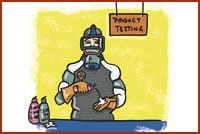Would you put lipstick up your ass? How about exfoliant cream? Yet you put lube up your ass and it’s classified as a cosmetic under Canada’s Food And Drug Act.
“Lubricants are generally classified as cosmetics since they are intended for use on the skin,” says Health Canada spokesperson Renee Bergeron. “[The] vagina and rectum are considered as part of the skin.”
Although we put lube up our love holes all the time, they are not required to be tested or approved for internal use.
“It is up to the manufacturer to ensure that the products are safe as intended for use,” says Bergeron, adding that Health Canada maintains the Cosmetics Hotlist, a list of toxic ingredients to help companies achieve that goal. Bergeron says the likely location of use for an ingredient — in this case the delicate mucous membranes of the rectum or vagina — is taken into consideration when ingredients are tested for the list.
But just because a lube is nontoxic doesn’t mean it’s going to do you any good when it comes to preventing sexually transmitted infections — or even that it won’t increase the chances of transmission. A 2004 study by the international nonprofit Population Council found that some lubes actually caused damage to rectal cells when tested on mice.
Part of the problem is that even scientists who want to address lube safety have run into roadblocks.
“This is science in progress,” says Jim Pickett, chair of the International Rectal Microbicide Working Group (IRMWG). “We don’t necessarily have a clear idea of what safety looks like.”
Not knowing what to test for makes it difficult to determine if a lube is safe or not, although ongoing research into microbicides — gels, liquids or creams applied as lubes, enemas or suppositories to prevent the transmission of sexually transmitted infections — has advanced our understanding of what a healthy coochie or cornhole is like.
Pickett stresses that any lube is better than no lube. “Your booty is a really tender, sensitive place. You should use plenty of lube to reduce friction so there’s less chance of rupturing the delicate anal tissues.”
Nonetheless, using the safest lube is crucial especially for queers who ride bareback — 34 percent of sexually active queer men, according to the 2002 Ontario Men’s Study. When you’re using a condom the safety of the lube will only come into play if there’s a condom break, whereas with no condom the lube will make a difference in likelihood of transmission every time.
“The Population Council has already done a whole set of safety studies on 12 lubricants,” says Pickett. The list of lubes studied and the findings are expected to be released later this year.
But Pickett says the work is far from done. “They just chose a whole bunch of lubes… kind of at random [from] what they could find. That’s great, but let’s find out what people are actually using.”
To help direct future rounds of lube safety testing, secretary and cofounder of the IRMWG Marc-Andre LeBlanc has created an on-line survey designed to find out what lubes people are using for hot backdoor action.
The survey also asks about how people use lubes and qualities they do and don’t like in a lube, information that Pickett says will be crucial when rectal microbicides eventually hit the market.
“If [a rectal microbicide] has the wrong smell or it’s too thick or you have to use way too much or it’s dispensed in a way that’s not attractive or appropriate, it doesn’t matter if it’s effective,” says Pickett. “People won’t use it.”
The survey, which has been up now for more than 15 weeks, has garnered more than 4,000 responses from 87 countries.
“It really took on a life of its own; we never anticipated this kind of response,” says LeBlanc.
The survey hasn’t just done well in terms of responses; it’s also been a huge success in terms of garnering volunteer support.
“Within minutes [of the survey being posted in English], we had responses back from volunteers to [translate it into] Turkish, German, Spanish and Portuguese,” says LeBlanc, who is paying out of pocket to host the survey on Surveymonkey.com.
LeBlanc hopes to get even more responses over the course of the summer by promoting the survey and LifeLube website at events throughout the upcoming Pride season. To that end, the IRMWG has formed a partnership with the Canadian AIDS Society.
Once the survey closes in August and the Population Council’s safety studies have been published, IRMWG may pick up the ball again, working to raise awareness among consumers, retailers and lube makers about product safety.
“We likely won’t have lots of clear cut things that say,” Pickett says, adding that it won’t be as simple as saying this lube is safe and this one isn’t. “It’s more likely that we’re going to have lots of lubes that are somewhere in between.”

 Why you can trust Xtra
Why you can trust Xtra


